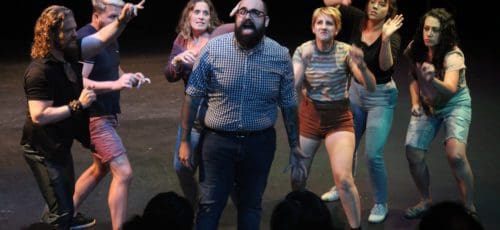Absurdity and Chaos: Interview with Neighborhood Fringe artist Emily Schuman
“We are wired to seek solace and meaning even in the most absurd of worlds.”

Fando y Lis in the 2014 Fringe Festival.
Fando y Lis, an absurdist play by Spanish playwright Fernando Arrabal, is coming to this year’s Neighborhood Fringe Festival. The play tells the story of two lovers, Fando and Lis, journeying through a barren nowhere-land while Fando pushes Lis, paralyzed from the waist down, in a cart. Director Emily Schuman translated the play into English, and has adapted her production to focus on the complexity of Lis’s story. Fando y Lis will run Sept 20–22 at the Shubin Theatre. We caught up with Emily to find out more.
FringeArts: How did you decide to work with Fernando Arrabal’s Fando y Lis?
Emily Schuman: I first read Fando y Lis as part of a summer research project I did at Denison University. I was really into absurd Spanish theatre at the time. Though we read so many of those plays in my Spanish literature classes, we never touched them in my theater classes. This project was my excuse to delve into Spanish theater and find a way to share it with English-speaking audiences. I found this amazing Spanish theater library when I was home in New York called the Jorge Luis Borges Library at the Instituto Cervantes, a Spanish cultural center. I was there for hours, reading play after play until I picked out Fando y Lis. I had never heard of Fernando Arrabal, but the first line of the play caught my attention and I couldn’t stop reading it. It was also the first time that I had read something in Spanish that I instantly understood without having to translate to English while I read.
I was drawn to Fando y Lis because it is a play that exists in complete absurdity and chaos, and yet these real, tangible issues, like relationships, love, identity and self-worth, are able to seep through the cracks and affect its viewers. That is why I find theater like this so powerful, because we are wired to seek solace and meaning even in the most absurd of worlds.
FringeArts: How has your production evolved from Arrabal’s play?
Emily Schuman: My production has evolved from the original play in our further exploration of the character of Lis, who is very complicated and enigmatic. She is paralyzed in her legs, which makes her extremely dependent on her lover Fando, who pushes her in a cart. I wanted to find interesting ways to shed light on her character and make this Lis’s story. I wrote a monologue for her that I believe gives her character depth, grounds her, and makes her more accessible to the audience. I also incorporated movement sequences that take us further into their absurd world and give variety to the tone of the piece both musically and visually.
The biggest development from Arrabal’s original play is that I decided to incorporate a burlap-covered mannequin that is used to represent Lis’s body. Lis experiences a lot of violence throughout the play both mentally and physically and I wanted to find a creative and effective way of conveying that violence to my audience without using stage combat. I might be alone in this theory, but I feel that when we see physical violence on stage, we say one of two things: “That punch looked so fake!” or, “I hope that actress is okay.” Either way, we are in our own heads, distracted from what is really happening to these characters. The incorporation of the mannequin into Fando y Lis is my way of exploring a symbolic and creative method of stage violence that viscerally affects my audience while keeping them in the story of the play.
As soon as we started using the mannequin in rehearsal to represent her body during these violent scenes, we started to see a whole new layer to the play that didn’t exist before. It is a layer that allows us to see this story through Lis’s eyes, a layer that gives new perspective to Arrabal’s vision.
FringeArts: What process did you go through to translate Fando y Lis?
Emily Schuman: I spent the first two weeks of my research directly translating the text of Fando y Lis into English, and then spent the rest of the summer adapting the language, choosing the right words, and incorporating my own concepts into the play. The process helped me to grow as a theater artist because it forced me to approach the work from new angles. I would not have been able to accomplish this project without the aid of professors Dosinda Alvite and Dr. Mark Evans Bryan, who guided me through the process and supported me the entire way.
FringeArts: Can you give us a little background on Fernando Arrabal and his work?
Emily Schuman: Fernando Arrabal is a playwright, poet, essayist, and novelist who is often associated with writers like Eugène Ionesco and Samuel Beckett. He was heavily influenced by avant-garde, surrealist artists of the 20th century, and is known for joining forces with filmmaker Alejandro Jodorowsky in 1962 to create the Panic Movement. It is a theatrical form that was inspired by Artaud’s Theatre of Cruelty and designed to shock its audiences with surreal imagery and chaotic performance art. The Panic Movement was their response to surrealism turning mundane and audiences becoming passive participants in theatre. Even though he wrote Fando y Lis before the Panic Movement, the play definitely carries the values of that movement. His characters actively engage their viewers by surprising us with their sudden switch to chaos and absurdity.
Arrabal currently lives in Paris, and seems like such an eccentric character. He has an interesting blog called Ceci n’est pas un blog (French for This Is Not A Blog), where he posts interviews, photos, and upcoming productions of his plays. When I wrote to him to ask his permission to perform Fando y Lis, he wrote back giving me his blessing, and posted my play’s information to the blog!
Thank you, Emily! We can’t wait!
Tickets for all Fringe shows are on sale now online. Get tickets for Fando y Lis here.
Fando y Lis by Fernando Arrabal
Shubin Theatre
407 Bainbridge Street
$10 / 65 minutes
Sept 20 at 2pm, 5pm + 8pm
Sept 21 at 4pm + 7pm
Sept 22 at 7pm
—Miriam Hwang-Carlos


